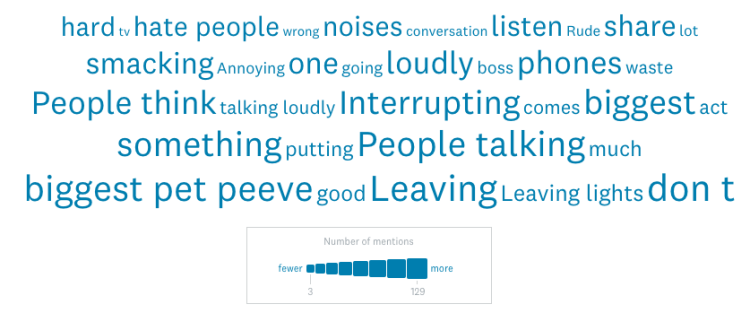Maybe you get antsy when your housemates leave a mess in the kitchen, annoyed when your partner starts snoring during the night or frustrated when your colleagues turn up late for meetings.
We wanted to find out what sort of things drive majority of people mad, so we asked 544 people about their biggest bugbears both at home and work.
Here’s what we uncovered. We hope the results won’t trigger you, though!
What are you curious about?
Run market research on a budget with SurveyMonkey Audience
Are your housemates annoyed? If so, it’s probably because of the mess you make
There are a few leading bugbears among housemates:
- Leaving common spaces messy (63%)
- Failing to take the rubbish out (45%)
- Talking loudly on the phone (30%)
- Taking food without asking for permission (24%)
Your household bugbears, however, can vary according to your age.
For example, approximately two in five young adults (18-29 years old) get annoyed when housemates take their food without their permission, compared to 19% of older adults (45-60 years old). Meanwhile, 37% of older adults get upset when a housemate changes the room temperature, compared to 30% of young adults.
Are your colleagues irritated? If so, they’re probably on the younger side
We also asked about the top workplace bugbears:
- Your colleagues complaining about their work and/or other colleagues (53%)
- Your manager not giving you credit when it’s deserved (50%)
- Your colleagues turning up late for meetings (33%)
- Your colleagues failing to recognise your contributions (31%)
Like at home, your workplace bugbears differ according to your age. This time, however, younger adults are more likely to get annoyed by just about everything we asked about.
For instance, in terms of the relationship with their manager, young employees are more sensitive when the manager says negative things about their work or colleagues (35% vs. 15% of older adults); they are more likely to become irritated if their manager cancels a meeting at the last minute (27% vs. 12%); and they have a higher chance of becoming riled when the manager is late for their meetings (40% vs. 29%).
Our biggest bugbears and how we respond to them
So what unsettles you the most? When we asked this as an open-ended question, we found that the responses varied widely:

Loud noises, people interrupting you, leaving the lights on and overuse of phones are just a few of our most common bugbears.
How do we respond when we experience them? The responses were just as diverse. Here’s what a few of our respondents told us:
“I get frustrated and leave.”
“I roll my eyes.”
“I calmly explain how much it bothers me.”
Now you know what puts people's heckles up, you’ll hopefully make more of an effort to stay on their good side, or to annoy them if that’s your intention!
P.S. Here’s our full list of the biggest bugbears:
- Leaving common spaces messy (63%)
- Colleagues complaining about their work and/or specific colleagues (53%)
- Your manager not giving you credit when it’s deserved (50%)
- Failing to take the rubbish out (45%)
- A bed partner hogging the duvet (39%)
- Your colleagues turning up late for meetings (33%)
- Your colleagues failing to recognise your contributions (31%)
- Talking loudly on the phone (30%)
- A bed partner moving around too much (29%)
- Taking food without asking for permission (24%)
- Cooking something that smells unpleasant (22%)
- A bed partner waking you up early in the morning (22%)
- A bed partner on their phone or computer late at night (22%)
- Playing loud music (22%)
- Occupying the kitchen for a long period of time (20%)




